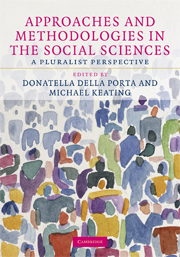Book contents
- Frontmatter
- Contents
- List of figures
- List of tables
- Contributors
- Preface
- 1 Introduction
- Part I Epistemology and philosophy of the social sciences
- 2 How many approaches in the social sciences? An epistemological introduction
- 3 Normative political theory and empirical research
- 4 Causal explanation
- 5 Constructivism: what it is (not) and how it matters
- 6 Culture and social science
- 7 Historical institutionalism
- 8 Game theory
- 9 Rationality and recognition
- Part II Research design
- References
- Glossary
- Index
2 - How many approaches in the social sciences? An epistemological introduction
Published online by Cambridge University Press: 05 June 2012
- Frontmatter
- Contents
- List of figures
- List of tables
- Contributors
- Preface
- 1 Introduction
- Part I Epistemology and philosophy of the social sciences
- 2 How many approaches in the social sciences? An epistemological introduction
- 3 Normative political theory and empirical research
- 4 Causal explanation
- 5 Constructivism: what it is (not) and how it matters
- 6 Culture and social science
- 7 Historical institutionalism
- 8 Game theory
- 9 Rationality and recognition
- Part II Research design
- References
- Glossary
- Index
Summary
Paradigms in the social sciences
Partisans articulate their positions with passion and intensity, yet the nature of what divides them is hard to pin down. At times we hear of a stand-off between ‘qualitative’ scholars, who make use of archival research, ethnology, textual criticism, and discourse analysis; and ‘quantitative’ scholars, who deploy mathematics, game theory, and statistics. Scholars in the former tradition supposedly disdain the new, hypernumerate, approaches to political science as opaque and overly abstract, while scholars of the latter stripe deride the ‘old’ ways of studying politics as impression istic and lacking in rigor. At other times the schism is portrayed as being about the proper aspiration of the discipline – between those who believe that a scientific explanation of political life is possible, that we can derive something akin to physical laws of human behavior, and those who believe it is not … at still other times the rivals are portrayed as ‘rational choice theorists,’ whose work is animated by the assumption that individuals are rational maximizers of self-interest (often economics, sometimes not), and those who allow for a richer range of human motivations (Shapiro, Smith and Masoud 2004a: 1).
This quotation from the introduction to a recent volume on Problems and Methods in the Study of Politics addresses a core methodological issue for the social sciences in general: how many approaches/methods are available for students in the discipline?
- Type
- Chapter
- Information
- Approaches and Methodologies in the Social SciencesA Pluralist Perspective, pp. 19 - 39Publisher: Cambridge University PressPrint publication year: 2008
- 40
- Cited by

